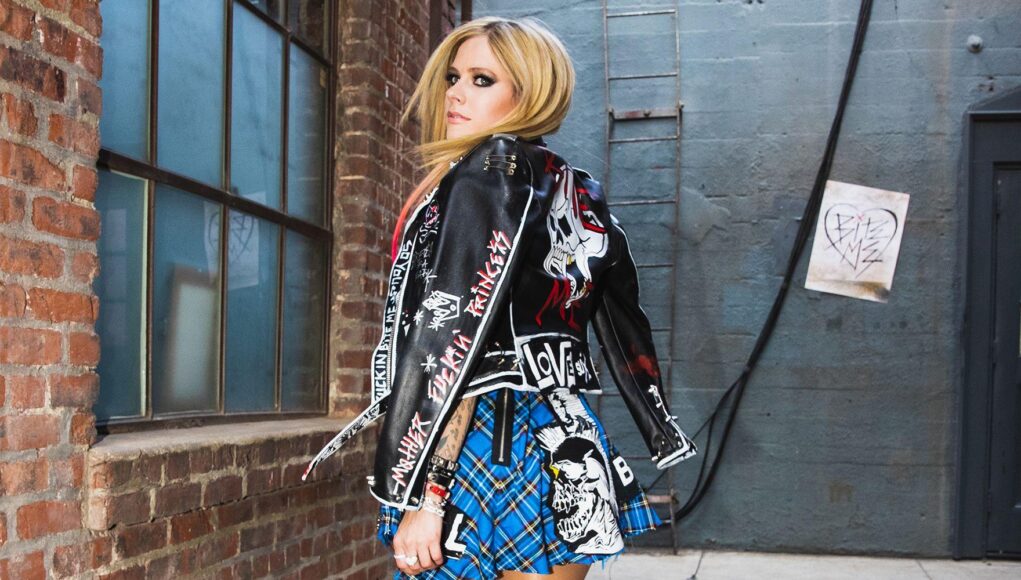“I’m trying to find an orange that doesn’t fade,” Avril Lavigne says with a laugh, stroking fistfuls of her hair.
Her lower layers are dip-dyed pale citrus, sticking out from her otherwise bleach-blonde head. Her “hair girl” did the dye job in her California home as Lavigne sat in the kitchen, ends covered in tin foil. Now the dye is fading like a sunset. Lavigne’s hair has been a marker of her evolution as a musician ever since she rose to stardom in the early 2000s, as a pin-straight dirty blonde teen singing about Sk8er Bois. She’s had black under layers in her Under My Skin era and streaks of hot pink on The Best Damn Thing album cover. She’s done hints of green (even green and pink together), girly platinum curls, and blonde highlights so bright they’re basically white. The orange, then, is a bold choice but still in character. New, but familiar.
“These are the album colors, orange and black,” she explains. The latter could refer to the black graphic hoodie she’s wearing, or the Zoom background behind her, or her signature heavy eyeliner. Either way, she’s committed to the color theme of Love Sux, her seventh album, which dropped Feb. 25. On the cover, she wears an all-black outfit and holds up black balloons against a red-orange backdrop.
Love Sux is Lavigne’s first album since 2019, and arrives almost 20 years after her smash debut Let Go, which gave us hits like “Complicated.” While her last project, Head Above Water, was a pensive reflection on her struggle with Lyme disease, this one finds her back in her rebellious pop-punk roots. One listen and you’ll feel like flat-ironing your side bangs and lining your arms with rubber bracelets again. The 12-track LP bursts with breakup anthems and a high energy that manifests in hyper drums, head-bopping electric guitar, and don’t-give-a-damn lyrics. “I don’t got time motherfucker, don’t ruin my life,” she warns potential suitors in “Break of a Heartbreak.” Blink-182 lead singer Mark Hoppus and Machine Gun Kelly are featured on the record, and she wrote it with artists like Travis Barker, who launched the label she’s now signed to, as well as now-boyfriend Mod Sun.
If Avril Lavigne, now 37, was ever going to make a comeback, there’s no better time than now. Nostalgia for Y2K and the emo aughts is at its peak, aesthetically and musically. The hottest celebrity couples are Barker and Kourtney Kardashian and Kelly and Megan Fox. (Both pairs were at Lavigne’s concert on the album’s release day.) Platform boots, rocker plaids, and leather pants are in again. Younger artists like WILLOW, Olivia Rodrigo, The Linda Lindas, and Meet Me @ the Altar are putting their own spin on the genre. And the explosive craze over the When We Were Young festival lineup—which includes OG favorites like My Chemical Romance, Paramore, and Lavigne herself—only confirmed that we’re longing for that era more than ever.
“I feel like pop-punk is a spirit, it’s an attitude, it’s middle fingers up high in the air,” Lavigne explains. “It’s an aggressive music where you can just say whatever you want—you don’t have to hold anything in. It’s a lot of fun, and that’s always been the spirit and the tone and vibe of all my concerts throughout the years. Even if my style or music has pivoted a bit.”
That’s the thing about trends: Those of us in the mainstream have dabbled in punk, moved past it, and are only revisiting it now; “But for me,” Lavigne shrugs, “I’ve always been kind of doing it.” When she first came on the scene, naysayers would argue that Lavigne didn’t write her own music or that she was just co-opting the punk rock sound and skater aesthetic, but two decades later, she’s still standing.
At the age when most girls are going to prom or learning to drive, Lavigne was making Let Go. When it was released in 2002, it would go on to peak at number two on the Billboard 200 chart—somewhere alongside Eminem, The Chicks, Ashanti, and Michelle Branch—and earn her eight Grammy nominations including Best New Artist. Her next two albums, 2004’s Under My Skin and 2007’s The Best Damn Thing, both debuted at number one.
In the early 2000s, when the hottest girls in music were feminine pop stars like Britney, Christina, and Beyoncé, Lavigne made her mark as the tomboyish girl next door. The Napanee, Ontario native stood out in a white tank top, army cargo pants, and loose neckties. She sang about posers who pissed her off, star-crossed love between skaters and ballerinas, and longing for attention and love, all with the palpable angst, innocence, and desperation of a teenager.
Her influence on young women, most of whom are now grown millennials, was undeniable. (The lyric, “He was a boy / She was a girl / Can I make it any more obvious?” is ingrained into our minds like a core memory.) But 20 years later, Lavigne still can’t fathom the impact of Let Go. “People bring it up to me in my interviews and stuff recently. And I’m just like, I don’t know if it’s ever really sunk in,” she says, throwing up one hand as the other holds a cup of tea. “I don’t think it really has.”
I attempt to explain why her album meant so much to girls at the time, including myself, but the message doesn’t quite come across. “It means a lot to hear that. And it’s, again, it’s really hard to believe,” she nearly guffaws here, “that something I went through that I wrote about, people were connecting with; and it’s just such a beautiful thing that music can do. It’s really dope.”
She’s also grateful “that any of my music has touched so many people.” Lavigne adds, “I just think about my different tours worldwide—China, Japan, Europe—and I’m just this girl from Canada.” But that is, in a sense, the point: Her image as a “regular girl,” even a bit of a troublemaker, was what made her so relatable. She continues to appeal to the young crowd today: “Sk8er Boi” has gone viral on TikTok. (Lavigne even joined the app with a video where she lip-synced the song and featured Tony Hawk.) And last year, she also collaborated with 20-year-old WILLOW (Willow Smith), an Avril Lavigne fan herself, on a song called “Grow,” which sounds like it could soundtrack a coming-of-age movie from the ‘00s. “I love what she’s doing; I love that she’s a female in the alternative lane,” Lavigne says, now a fan of WILLOW, too.
She feels similarly about Olivia Rodrigo. “Honestly, it was really cool meeting Olivia, because she’s having such a huge impact and people are really relating to her because she’s a young songwriter writing about what she’s going through, where she’s experiencing young heartbreak. And I think she’s so real and raw in her lyrics. And when you do that and you do it right, people really connect.”
It’s hard not to see the parallels between the success of Rodrigo’s Sour and Lavigne’s own debut. “She told me she was a huge fan and that was super flattering; it’s crazy that I’m at that point in my life where I’ve been around that long,” Lavigne says in disbelief. “I see so much of myself and my own journey through what she’s doing. She’s her own person, but writing songs at 17 and the first album exploding and then it’s this crazy whirlwind.”
Lavigne doesn’t listen to her old music unless she’s performing it. I mention that I’ve seen fans tweeting a clip of her singing at the top of her lungs from the “I’m with You” video. The caption is usually saying something about the power of her voice and her talent at such a young age. Lavigne hasn’t seen this tribute specifically, but memories of making the song are still fresh. “I remember being in the booth, I remember recording it. I remember singing the yeah-yeahs.” Admittedly, she isn’t listening to “a whole lot” right now, but she loves playing country artists like Miranda Lambert, Dan + Shay, and Florida Georgia Line when she’s driving in her truck.
As one might guess, Lavigne wrote Love Sux after a breakup. (She doesn’t say with whom, though reports broke in late 2019 that she and businessman Phillip Sarofim split after two years together. She was also linked to musician Pete Jonas in early 2020.) “I had plenty of time over the pandemic to reflect on myself. And the album is trials and tribulations of love and that sort of set the tone,” she says.
The title track was one of the first songs she wrote for the album. “I was feeling like love sucked and I was feeling exhausted and jaded [about] it. And like love was overrated. And that was the first time I’d ever really felt that way.”
You can hear that bitterness in the lyrics. “Not another breakup / When I think of you, I just want to throw up,” she says in the chorus of the title track. It’s cathartic and petulant and even a little silly, which Lavigne freely acknowledges. “It’s a fun record and it helps you laugh about all the messed up things that love can do to you.” Even with her—and the album’s—tough exterior, there are moments of vulnerability, like the piano-led “Dare to Love Me.” “It’s about, ‘Okay, don’t tell me you love me unless you mean it.’”
Lavigne’s gripes about heartbreak didn’t last long after she started writing the album. “And then a couple days later I had a new boyfriend,” she says, laughing at herself and referring to Mod Sun (whose real name is Derek Smith). In addition to working on Love Sux together, the two musicians released the collab “Flames” in January 2021 before going Instagram official in April.
So at this point, does she feel like love still sucks? “I mean, love can be hard, love hurts, it doesn’t always end well. It usually doesn’t,” Lavigne adds with an almost-cackle. She’s been through two marriages, the first with Sum 41’s Deryck Whibley and the second with Nickelback’s Chad Kroeger, which ended in 2015. But Lavigne is a libra; she loves love, she says.
“I definitely want to be in a relationship and I am; I’m super happy and I’m in a really good place in my life now,” she continues. “And I think love is what ultimately keeps you coming back for more.”
Lavigne started making Love Sux without management or a record label and ended up with what she calls her “dream album.” Two decades into her career, she just wanted to have fun on her own terms. “There’s a lot of business stuff that can always get in the way and record labels that chime in and give you direction and deadlines and tell you what way your music needs to be, what direction you need to go in,” she says. “I’ve always had to fight for my own sound and the vision of my record.”
Later on, looking back at her early days, she adds, “I’ve been in situations where I’ve been uncomfortable with the direction they want to push me towards or the people they want me to work with. There’s definitely been battling over the years.” But she clarifies: “I had a lot of support early on from songs to image and everything.” She shouts out L.A. Reid, who signed her to Arista back in 2000, for letting her “do my thing.”
Not a lot of people let her do that back then. When she was making her first album, she remembers getting in the studio and the first batch of people she worked with in New York “weren’t really listening to me.” (She recalls thinking of the songs they offered her, “This shit’s terrible.”) Eventually she clicked with Clif Magness and the songwriting team The Matrix (Lauren Christy, Graham Edwards, and Scott Spock) in L.A., and the rest is history.
Lavigne pushed to write or co-write her own songs, and pushed back against “bubblegum pop”—that “was not my style at all,” she recalls. Even if her music was pop-adjacent, it still had edge; it was all a balancing act. After all, she was a high schooler listening to the Goo Goo Dolls, Matchbox Twenty, Blink-182, Green Day, and Alanis Morissette. “So when I made my album, I just wanted to fucking rock and I wanted my music to be guitar-driven. I definitely had to express that over and over and over because it wouldn’t have gone that way.” Despite the clashing opinions, Lavigne is ultimately “proud of all the albums and the songs on them.”
With 20 years under her studded belt, where does Lavigne see herself in the next 20? She first pauses to do the math. “That’s old,” she realizes. “I don’t know, honestly, still doing this, probably.” She mentions Paul McCartney, who’s almost 80 and is still making music and touring, and imagines a similar future for herself. “I think that I’ll write songs for the rest of my life and I think I’ll always record music,” she says confidently, the hood of her sweatshirt now covering her head.
Surely, a career like Lavigne’s must have required some leaps of faith, so I ask her about the biggest risk she’s ever taken. She takes a moment to search for the answer. “Um…” her voice trails and her eyes drift off-screen. “I don’t really think it’s that deep,” she replies. “It’s just rock and roll, baby.”









